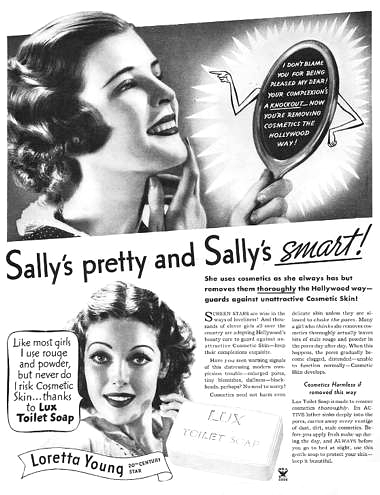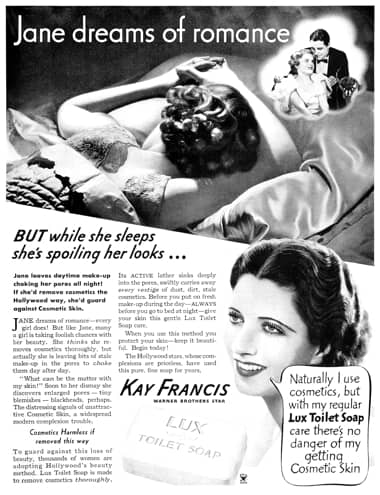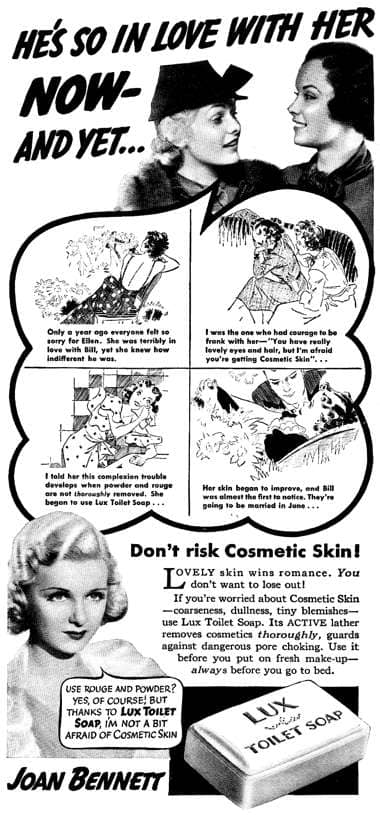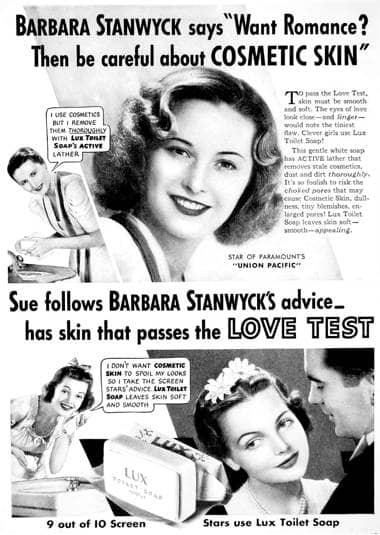Cosmetic Skin
In 1934, Lever Brothers placed an advertisement in the World-Telegram newspaper for Lux Toilet Soap, warning consumers about the dangers of ‘Cosmetic Skin’.
LOOK OUT! you’re getting coarse cosmetic skin. Thousands of Girls menaced by COSMETIC SKIN adopt Hollywood’s Beauty Method.
(Lux advertisement, 1934)
Protest
Soon after the advertisement appeared, a protest telegram was sent to Lever Brothers Co. – the manufacturers of Lux soap – on behalf of the Associated Manufacturers of Toilet Articles (AMTA) and the Perfumery & Cosmetic Institute (P&CI). The telegram denounced the Lux toilet soap advertisements as a “a libel on the entire cosmetic industry” and charged Lever Brothers with creating an imaginary disease that was without any scientific backing. Additional telegrams were sent to publications likely to carry Lux toilet soap advertisements and a follow up letter was sent to Lever Brothers from the Trade Practices Committee of the AMTA (AP&EOR, 1934).
Given that Lever Brothers was a member of the AMTA they were duty bound to reply. In their response they asserted that the only inference made in the Lux advertisement was that if cosmetics were allowed to accumulate in the pores of the skin they would be harmful. They backed this statement up with a series of quotes from scientific authorities on the importance of soap and water in cleansing the skin, and with numerous quotations from beauty writers and cosmetic companies describing the importance of cleansing the skin’s pores so that it was free of dirt, oil and cosmetics (AP&EOR, 1934).
The last part of their defense must have been particularly galling to the cosmetic industry, given the barrage of material they had been putting out over the years on using cleansers to keep the pores unclogged and the skin smooth and clear. It is not surprising then that some consumers would have been receptive to the idea of ‘Cosmetic Skin’ and that some beauty writers found elements of truth in the Lux advertisements.
Various soap manufacturers advertise their soap is the best cure for cosmetic skin.
Actually there should be no such thing as cosmetic skin but, like most advertisements, there is some truth in what these people say.
It means that cleanliness is the important thing. Ladies allow their powder, mingled with dust and perspiration, to clog the pores, and these bright days show what the dark days and another layer of powder have hidden.
When you treat a client suffering with a cosmetic skin do not spare the liquefying cleansing cream, and for the first couple of visits use the astringent well diluted. You will find that when the pores are free and able to breathe, the closing of them will be easy; in fact they will contract naturally.(Hairdresser and Beauty Trade, 1937)
To a certain extent the beauty industry was ‘hoist with its own petard’. However, it was one thing for a cosmetic company to point out the need to clean pores of old cosmetics and quite another for a soap company to do so. Although the Trade Practices Committee of the AMTA acknowledged that washing the skin with soap and water was a good thing, they still thought Lever Brothers had made false and misleading statements in the Lux advertisement. In hindsight, they should not have been worried.
Soap versus cleansers
The Lux advertisements on the dangers of cosmetic skin were an indication that by the 1930s, when it came to cleaning the face, soap was losing out to cosmetic cleansers. This point was not lost on some from the cosmetics industry.
It is a fact that a once impregnable position has been stormed and that the quality which is said to be next to godliness is being achieved by newer ways to-day. But this challenge can be met by methods other than the one we have drawn attention to here. And we do not think that the invention of such methods is beyond the fertile imagination of those who have raised the bogy of “Cosmetic Skin.”
If readers are overwhelmed with inquiries from clients as to what is cosmetic skin, or if they are in danger of incurring the “condition,” they should not hesitate to tell them that the complaint is an imaginary one, and also use the opportunity to inform them of the qualities of modern manufactured cosmetics and the benefits they confer on the skin and the general appearance without the slightest possibility of causing harm.
It may be that “Cosmetic Skin” will prove a blessing in disguise if only because it will induce many of us to undertake a little mission work with regard to our most profitable source of sales revenue.
One thing is certain, to deride cosmetics will never increase the sales of soap. So the campaign is an unfortunate one.(Hairdresser and Beauty Trade, 1937)
Meanwhile, further communications had passed between Lever Brothers and the AMTA and P&CI. However, when push came to shove, Lever Brothers reiterated they did not think they were violating the cosmetics industry code and besides Lux really fell under the soap and glycerine industry, over which the AMTA and P&CI had no control (AP&EOR, 1934).
The Lever Bother’s “Cosmetic Skin” campaign ended in 1939, possibly because of the passing of the U.S. 1938 Food, Drug and Cosmetic Act, which included provisions for false and misleading advertising. Ironically, the Act resulted in many long-standing members of the American cosmetic industry being prosecuted for making the same sort of unscientific claims present in the Lux “Cosmetic Skin” advertisements.
Updated: 14th April 2014
Sources
Eve: A Lady’s Pictorial. London.
Hairdresser and Beauty Trade. London.
“Lux” publicity starts controversy. (1934). The American Perfumer & Essential Oil Review. May, 115-117.

1934 Lux Toilet Soap.

1934 Lux Toilet Soap.

1936 Lux Toilet Soap.

1939 Lux Toilet Soap.
